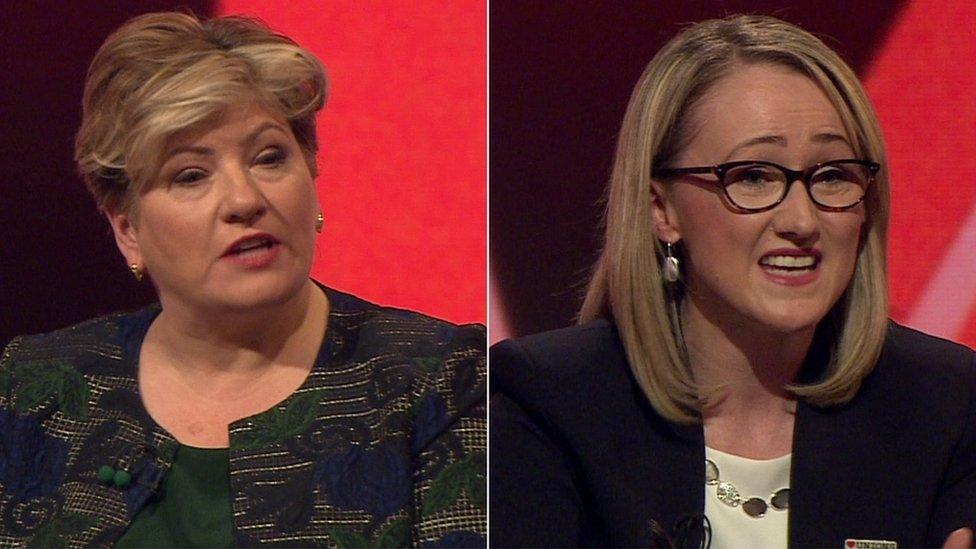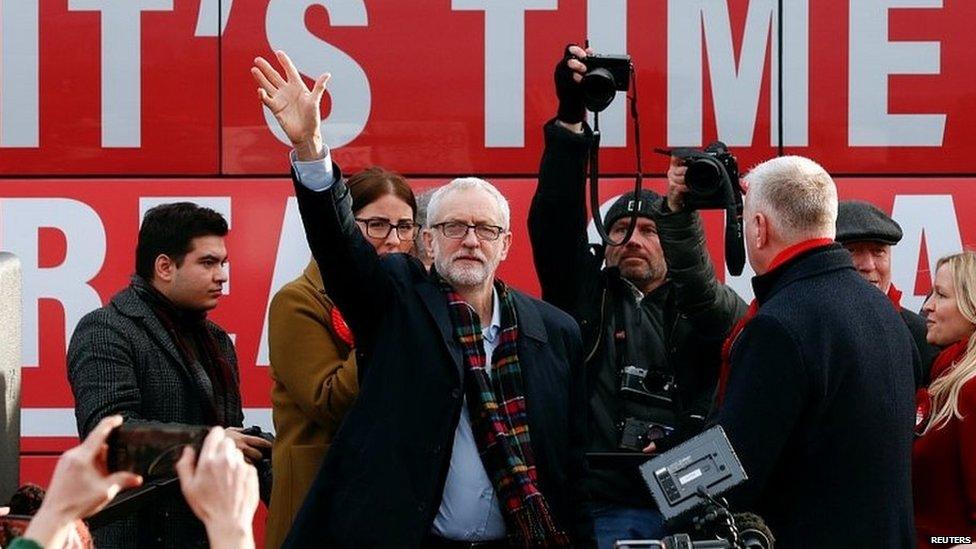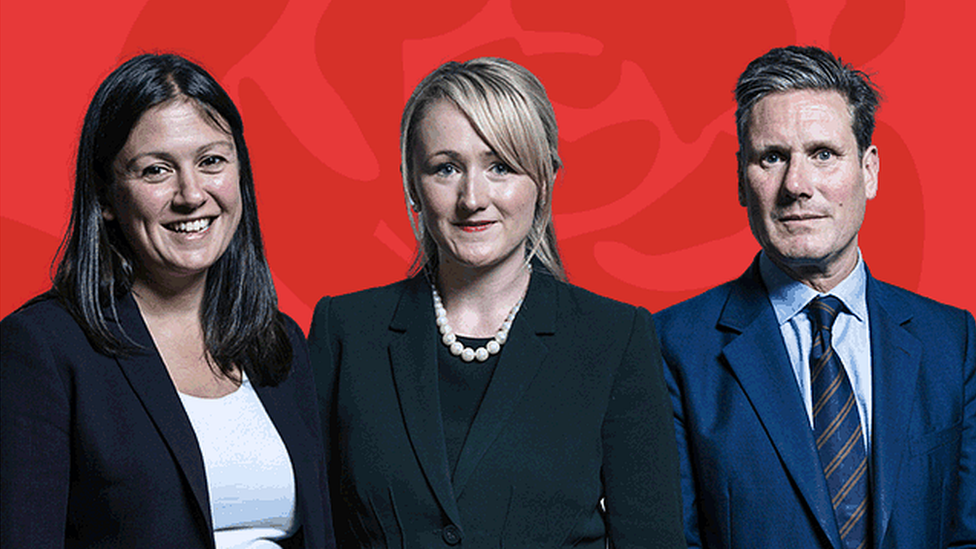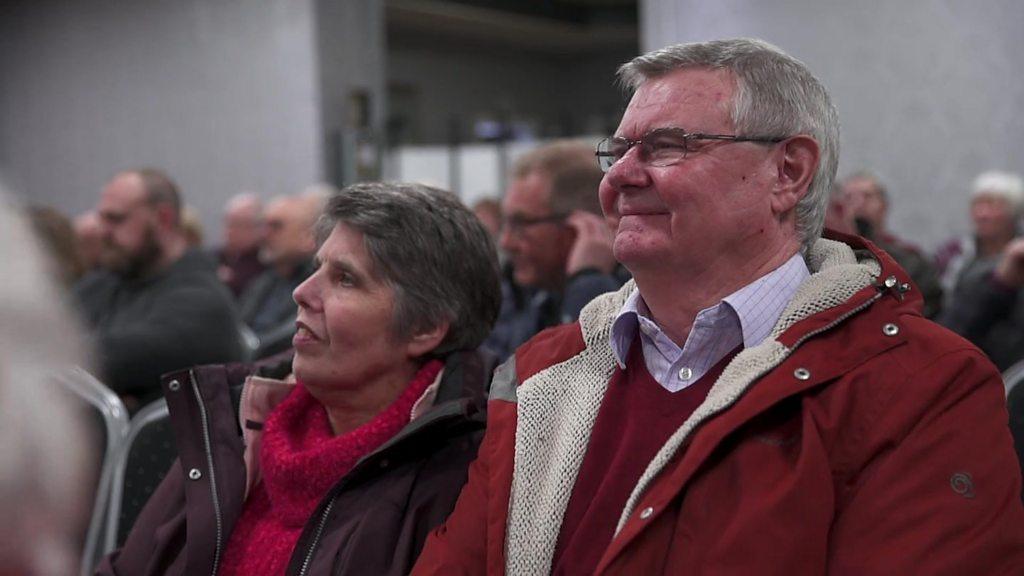Labour leadership: Emily Thornberry's zinger to keep her in the game
- Published

Emily Thornberry and Rebecca Long-Bailey clashed during Newsnight's Labour leadership hustings
When a candidate is down, but not yet out, they need a zinger to keep them in the game.
Emily Thornberry secured such a moment in Newsnight's Labour leadership debate with a withering put-down of her rival, Rebecca Long-Bailey.
"Sorry, I don't remember," Ms Thornberry said after Mrs Long-Bailey claimed she had challenged Jeremy Corbyn about alleged anti-Semitism in the Labour Party during shadow cabinet meetings.
Needing to garner attention - and with little to lose - Ms Thornberry happily cast herself as the outsider ready to spill the beans from the shadow cabinet.
She spoke of how she warned Mr Corbyn against agreeing to Boris Johnson's timetable for an election and had foreseen Labour's subsequent heavy defeat.
Ms Thornberry, the shadow foreign secretary, needed to punch through because she is the only one of four candidates still in the contest without a place in the final round.
She needs to be nominated by a further six constituency Labour parties to allow her to go through on Friday to the final ballot.
The prize for outsider of the night went to Lisa Nandy, the Wigan MP, who resigned from the shadow cabinet in 2016 in protest at Mr Corbyn's leadership.
Newsnight debate: Candidates debate Labour's general election failure and anti-Semitism
Ms Nandy joined Ms Thornberry in a show of hands on Newsnight when the presenter Katie Razzall asked who had foreseen the defeat.
But Ms Nandy went furthest in criticising the leadership, suggesting that Labour had still not understood how the ground collapsed beneath the party in December's election. In a swipe at the manifesto she added that it was wrong to try to nationalise everything.
As the candidates trailing in the contest, Ms Thornberry and Ms Nandy needed to make their mark with more aggressive pot-shots at the leadership and their rivals in the contest.
Sir Keir Starmer, the frontrunner, and Mrs Long-Bailey, the candidate of the Corbyn left, needed to avoid dropping the proverbial Ming vase with any unforced errors.
They were careful to show respect for Mr Corbyn. Sir Keir said it was wrong to blame the Labour leader for four successive election defeats while Mrs Long-Bailey said it was wrong to dismiss his "transformative" policies.
But Mrs Long-Bailey showed she believes Sir Keir's weak point was his advocacy of a soft Brexit in the last parliament.
The shadow Brexit secretary seemed to be acutely aware of his vulnerability when he interrupted Mrs Long-Bailey to say that the shadow cabinet had agreed the policy.
Adopting a tone of sympathy, Mrs Long-Bailey said she understood why her rival had acted to avoid a no-deal Brexit. But she said that to people in Labour's communities it all looked like parliamentary games which had contributed to Labour's defeat.

Jeremy Corbyn said he would step down as Labour leader following the party's heavy defeat in December's general election
Sir Keir came well-prepared for attacks on Brexit. But he later showed that he had no qualms about being pro-European, as he called for his children's generation to be given the same opportunities he enjoyed.
"All my life I have been able to go and work in Europe or to live in Europe or to study in Europe and I want the next generation to have those opportunities," he said. "I don't want to kick that away for them." But he stopped short of advocating a return to EU membership.
The first televised debate of the Labour leadership contest highlighted the battle lines as it enters the final stage. Sir Keir, the frontrunner, and Mrs Long-Bailey, his nearest rival, are gently trying to cast themselves as new brooms while showing suitable respect for the retiring leader.
The trailing outsiders, by contrast, are taking no prisoners as they rail against the current leadership - with the odd snipe against their rivals - as they issue dire warnings about the dangers of failing to embrace radical change.
- Published18 February 2020

- Published12 February 2020

